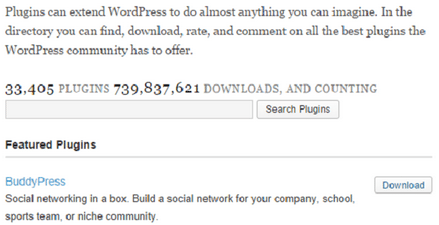11 years, 4 months ago, the world changed for the better.
How, you ask? WordPress was created, published, and released to the public.
It spread like wildfire and had millions of users within a couple years.
And as the user base of ol’ WordPress continued to grow, so did the capabilities of the platform. What started out as a simple software to facilitate blogging has evolved into an extremely versatile content management system, which can be used to power just about any type of website.
Today, WordPress is super flexible and can be adjusted every which way to suit your personal website needs.
Evolution of WordPress
Although is hard to pinpoint the specific things that drove WordPress’ evolution into a capable, multipurpose CMS, there are quite a few things to which WordPress every-changing abilities are owed.
Plugins
Plugins are the number one way to add functionality to your WordPress site. Available at the WordPress repository by the tens of thousands (currently 33,405 free, user-contributed plugins are available at WordPress.org), plugins were one of the main things that helped users embellish their WordPress sites, with all of the latest bells and whistles in the website development world.
Support for plugins was added to WordPress in the 1.2 Mingus update.
Themes
Themes are another popular aspect of WordPress, which helps service multiple types of websites. Different looks that suit different niches of websites can all be set up on your WordPress website, thanks largely to both the large libraries of free and paid themes out there.
bbPress and BuddyPress
bbPress and BuddyPress are two primary plugins that users think of when it comes to forum functionality. The former was developed by Matt Mullenweg in 2004, while the latter was released by Automattic in 2009. bbPress was the very thing that brought forum functionality to WordPress.
Open Source
Yet another one of the most praised facets of WordPress is the fact that it’s open source. This means that anyone can add to it, change it, or contribute to future updates. Open source has been a driving force in making WordPress desirable to all, since it allows the software to be super customizable and compatible with everyone’s needs.
WordPress Purposes
Now that we’ve explored how WordPress came to be so functional, let’s take a look at what exactly it can do.
Corporate Websites
Nowadays, corporate websites seem to be one of the most common uses for WordPress. These websites — which incorporate multiple elements like company timelines, staff profiles, and much more — are easily created within the WordPress platform.
Portfolio Websites
Portfolio websites are another popular use of websites. Freelancers, photographers, artists, and many others use powerful WordPress plugins and themes to create beautiful, fluid portfolio websites that will stun any potential client.
Company Collaboration
Due to the multi-account ability of WordPress, companies can use WordPress to aid collaboration between employees. For instance, one of the many helpdesks/support ticketing systems built into WordPress plugins and themes can be installed as the primary customer support channel for a business. Customer service reps can then collaborate with each other through the native WordPress UI, and helping each other with support requests from customers.
Website Analytics
Though, out-of-the- box, WordPress itself doesn’t offer any analytic/traffic-tracking capabilities (save the small functions in Jetpack Stats), there are numerous plugins, and even third-party analytics tools, which integrate well with the CMS, and make website analytics easy and painless within WordPress.
Blogs
Now we get to the foundational use of WordPress — blogs.
There’s no doubt that blogs are currently the #1 purpose of all websites powered by WordPress (and personally, I don’t see that statistic changing any time soon). It’s what WordPress was originally built for, but today, there are so many new tricks and talents within WordPress, and its growing selections of plugins and themes, which makes the blogging process even more powerful.
Wrapping Up
The purposes I’ve listed here are only a small sampling of what this powerful CMS can do. In actuality, there is a plethora of innovative ways that WordPress can be used.
I hope that this post has, in at least some small way, helped you to appreciate the true greatness of WordPress, the CMS that everybody knows and loves.
Though WordPress is most impressive, there are quite a few things I would personally do to improve it. But overall, its advantages far outweigh its disadvantages.
The CMS’s many features, capabilities, and community, help its users to realize one very obvious thing – you just can’t go wrong with WordPress.
What’s your favorite thing about WordPress? Share your thoughts in the comments below!
 Jonathan John is a WordPress enthusiast and freelance blogger. He loves comparing WordPress plugins and themes, sharing the latest Automattic news, and helping non-techies get the most out of the world’s favorite CMS.
Jonathan John is a WordPress enthusiast and freelance blogger. He loves comparing WordPress plugins and themes, sharing the latest Automattic news, and helping non-techies get the most out of the world’s favorite CMS.



No Comments